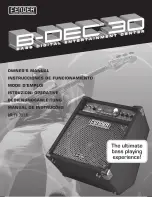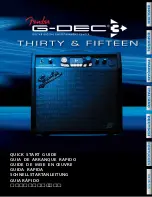
9V
0.2V
INPUT
LEVEL
PHASE
0
180
BASS EQ
0
10dB
BASS EQ
0
9dB
15
35Hz
SUBSONIC
10
40Hz
SUBSONIC
30
250Hz
LPF
35
250Hz
LPF
40
300Hz
LPF
FULL
LP
HP
XOVER
MONO STEREO
MODE
FULL LPF HPF
XOVER
MONO STEREO
MODE
60
1.3KHz
HPF
60
1.2KHz
HPF
SPEAKER
OUTPUT
SPEAKER
OUTPUT
SPEAKER
LEFT
RIGHT
BRIDGED
OUTPUT
SPEAKER
LEFT
RIGHT
BRIDGED
OUTPUT
SPEAKER
OUTPUT
SPEAKER
OUTPUT
SPEAKER
LEFT
RIGHT
BRIDGED
OUTPUT
SPEAKER
LEFT
RIGHT
BRIDGED
OUTPUT
SPEAKER
LEFT
RIGHT
BRIDGED
OUTPUT
SPEAKER
OUTPUT
SPEAKER
OUTPUT
SPEAKER
LEFT
RIGHT
BRIDGED
OUTPUT
SPEAKER
LEFT
RIGHT
BRIDGED
OUTPUT
SPEAKER
LEFT
RIGHT
BRIDGED
OUTPUT
SPEAKER
OUTPUT
SPEAKER
OUTPUT
SPEAKER
OUTPUT
SPEAKER
LEFT
RIGHT
BRIDGED
OUTPUT
SPEAKER
LEFT
RIGHT
BRIDGED
OUTPUT
SPEAKER
OUTPUT
Setup
Common System Setup
The input MODE switch will “sum” or
combine the right and left channel signals
in the MONO position to improve bass
performance. Select MONO only when the
amp is being used for subwoofers.
typ
The XOVE
e switch sets the
e
R Mod
of crossover that will be active. 4
el
chann
models will have two switches, one for each
set of channels.
The HPF(hig
ss filter) control will limit the
h pa
output below the selected frequency. This
is typically used to protect midrange and hi
frequency speakers from damage and to
allow a smooth transition from a subwoofer.
The LPF(low pass filter) control will limit
output above the selected frequency. This
is used to allow a smooth transition to the
higher frequency speakers.
1.
If possible, with the source unit off, confirm that the primary volume control is
is
turned down (counter clockwise).
2.
Turn on the source unit (CD, or MP3 player). Re-confirm that the volume
turned down. Make sure the source unit controls; balance, fader, bass and
LED on
treble are all set to center or “0” adjustment. Make sure that the green
the end of the amplifier is illuminated.
3.
Play a clean musical selection of which you are very familiar. CD is preferred.
Do not use radio signals for level setting. Hit play and start turning the volume
of the source unit up.
4.
Stop increasing the source unit volume when you reach 3/4 (about 75%) or
until you hear speakers begin to slightly start producing distortion.
5.
Increase the amplifier level (clockwise) until distortion is heard, then back
the level down (counter clockwise) until the distortion is eliminated. Small
adjustments may need to be made to balance the levels of multiple amplifiers.
Input Mode
Xover Mode
High pass
Adjustment
Low pass
Adjustment
Bass Boost
Remote Level
Control
2ch - Full Range
ch -
4c
4
4ch
4ch -
Mixed
ch -
c
4
4ch
4
Mono
A
B
C
D
E
F
The BASS BOOST or BASS EQ control
will increase the output at 45Hz for more
pronounced bass. Exercise caution.
Increase the level in small amounts until
distortion is noticed, then back off a little.
Some models include a bass
remote. Avoid adjusting the bass
remote while operating vehicle.
This is a critical step to insure your amplifier
is properly adjusted to match the signal
output level of your source unit.
THIS IS NOT A VOLUME CONTROL!
Level Setting
G
MONO STEREO
MODE
FULL LP
PF
F H
XOVER
60Hz 1.2KHz
HPF
30Hz
250Hz
LPF
0dB
9dB
BASS
BOOST
6V
0.2V
LEVEL
FULL LPF HPF
XOVER
MONO STEREO
MODE
FULL LPF HPF
XOVER
60Hz
1.2KHz
HPF
30Hz
250Hz
LPF
CH 1/2
CH 3/4
FULL LPF HPF
XOVER
0Hz
Hz
6
1.2KHz
HPF
30Hz
250
LPF
FULL LPF HPF
XOVER
60Hz
1.2KHz
HPF
30Hz
250Hz
LPF
CH 1/2
CH 3/4
FULL LPF HPF
XOVER
60Hz
1.2KHz
HPF
30Hz
250Hz
LPF
SPEAKER
LEFT
RIGHT
BRIDGED
OUTPUT
SPEAKER
OUTPUT
15Hz 55Hz
SUB
SONIC
40Hz 150Hz
LOW
PASS
SPEAKER
OUTPUT
LEFT
RIGHT
BRIDGED
SPEAKER
OUTPUT
LEFT
RIGHT
BRIDGED
SPEAKER
OUTPUT
LEFT
RIGHT
BRIDGED
SPEAKER
OUTPUT
LEFT
RIGHT
BRIDGED
Quick Start
Installation Guide
Congratulations on your choice of a Crunch amplifier. This
“Quick Start Installation” guide is meant to help you “hook
up” and play music.




















